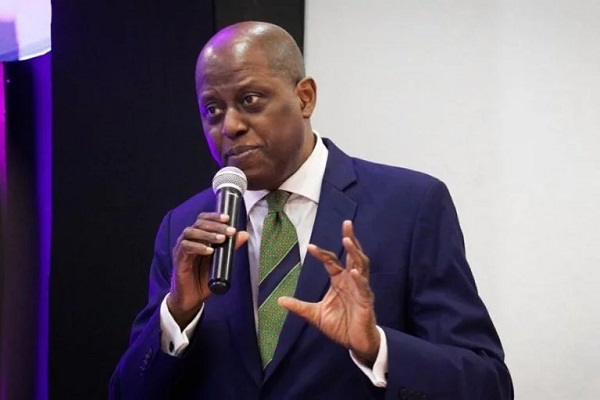
Governor of the Central Bank of Nigeria (CBN), Mr. Olayemi Cardoso, on Tuesday declared that the Nigerian economy had been transformed in the past two years, driven by bold reforms and decisive actions that had restored confidence in the economy and laid the foundation for long-term stability.
As a result, Cardoso said the exchange rate had stabilised, with the naira continuing to strengthen, while the spread between the official and bureau de change rates were below two per cent.
Speaking at the 20th Anniversary Colloquium Lecture of the Monetary Policy Department (MPD) in Abuja, Cardoso said the stability had restored investor confidence and reduced uncertainty for households and firms.
Vice President Kashim Shettima stressed Nigeria’s readiness to do business with the rest of the world, saying ongoing reforms undertaken by the administration of President Bola Tinubu across different sectors are opening new opportunities for investment.
Shettima spoke when he received in audience a delegation from Advanced Energy Partners (AEP), led by Chairman of the consortium, Senator Abu Ibrahim, at State House, Abuja.
The vice president said, “There is no better time to invest in Nigeria. You have come at the right time, where we have been blessed with committed leadership.”
He outlined the abundant resources and potential across Nigeria, saying the Tinubu administration, through specific policies and interventions, is creating an enabling environment for the economy to grow and attract foreign direct investment (FDI).
Shettima told the delegation, “Be rest assured that you have invested your trust in the right nation. Nigeria is ready for business. We have crossed the Rubicon and are now on the path of sustainable development.”
Cardoso stated that inflation had moderated significantly to 16.05 per cent in October 2025, from a peak of 34.6 per cent in November 2024, marking seven consecutive months of disinflation, the lowest in three years.
The CBN governor added that core inflation had also begun to soften, suggesting that the cumulative effect of tight policy settings is transmitting through the economy.
He said the foreign reserves had risen to $46.7 billion, as of November 14, 2025, providing 10.3 months of import cover in goods and services, supported by sustained inflows and renewed investor participation across various asset classes.
Cardoso said, “This accretion reflects investor confidence in our policies leading to improved oil receipts, stronger balance of payments, and renewed foreign portfolio inflows.
“On the back of this confidence, all the three top international ratings agencies upgrade Nigeria, with the latest by S&P Global Ratings, which revised our sovereign outlook from stable to positive.
“This recognition reflects the impact of sustained reforms that have placed our economy on a more resilient path.”
Represented by CBN Deputy Governor, Economic Policy Directorate, Dr. Muhammad Sani Abdullahi, Cardoso said the progress was complemented by Nigeria’s removal from the Financial Action Task Force (FATF) Grey List, marking another significant milestone in restoring international confidence in the financial system.
He said, “This achievement demonstrates our full alignment with global standards on anti-money laundering and counter-terrorism financing, further unlocking opportunities for foreign investment and trade finance.
“Together, these measures have created a more competitive currency, improved trade balances, and strengthened the foundation for inclusive development.”
He added, “While we acknowledge these contributions, the department must remain agile and forward-looking.
“It should deepen its analytical capacity, strengthen modelling tools, and continue to embrace innovation to ensure that the bank is well-positioned to respond effectively to emerging macroeconomic challenges.
“This includes leveraging technology, big data, and advanced analytical techniques to improve policy outcomes.”
The central bank governor stated that one of the most significant tasks ahead was successful transition to a full inflation-targeting regime. He said this was not merely a technical adjustment, but a strategic imperative for anchoring expectations and sustaining price stability.
However, Cardoso commended the MPD for its efforts in this direction and urged that these efforts be accelerated.
He said, “Inflation targeting will enhance transparency, improve credibility, and strengthen the effectiveness of monetary policy transmission.
“I also commend the department for organising this lecture and for the choice of the topic. It underscores the importance of continuous learning and intellectual engagement in shaping policy.
“I expect that the insights shared will inspire robust discussions and inform strategies that will guide the bank in navigating the next phase of its evolution.”
He added, “As we celebrate this milestone, let us remember that our ultimate goal extends beyond technical achievements. It is about building a resilient economy that fosters growth, creates jobs, and delivers shared prosperity.
“Monetary policy must remain credible, coherent, and adaptive to changing realities.
“To the monetary policy department, I say: congratulations on this anniversary. Your contributions have been valuable, but the journey ahead requires even greater commitment, creativity, and collaboration.
“Continue to innovate, continue to strengthen coordination, and continue to uphold the highest standards of professionalism.
“To our partners, past and present staff, and all stakeholders, thank you for your support and dedication. Together, we will ensure that the central bank remains a beacon of stability and progress.”
Cardoso said, “As we mark 20 years of the Monetary Policy Department, let this occasion serve as both a celebration and a call to action.
“The challenges ahead are formidable, but with discipline, foresight, and unity of purpose, we will overcome them.”
In his remarks, CBN Director, Monetary Policy Department, Dr. Victor Oboh, said the occasion was more than a celebration of two decades of existence. Oboh said it was also an opportunity to reflect on the evolution of monetary policy in Nigeria, acknowledge the contributions of the pioneering department, and chart a path for the future amid an increasingly complex global and domestic environment.
He said, “The economic landscape is evolving rapidly. We continue to face persistent inflationary pressures, exchange rate volatility, and structural imbalances, all compounded by external shocks such as geopolitical tensions and commodity price swings.
“These realities demand continuous reassessment and refinement of our monetary policy framework.”
Oboh stated, “The theme of today’s lecture, ‘Monetary Policy in Nigeria: Past, Present, and Future,’ is therefore, particularly apt. It invites us to take stock of our journey over the past two decades, examine the current realities shaping monetary policy, and anticipate the challenges and opportunities that lie ahead.”
He said this underscored the dynamic nature of monetary policy and the imperative for continuous evolution and adaptation in response to emerging macroeconomic shocks and global developments.
Oboh added, “The Monetary Policy Department occupies a central role in the Bank’s institutional architecture. Its work underpins the formulation and coordination of monetary policy.
“Over the years, the department has provided robust technical support to strategic committees—including the Monetary Policy Committee, the Monetary Policy Technical Committee, and the CBN Board—ensuring coherence in policy deliberations and decision-making.
“Its contributions have resulted in landmark achievements, including introduction of the Monetary Policy Rate (MPR) in 2006 as the primary signaling instrument for monetary policy stance, replacing the Minimum Rediscount Rate, thereby enhancing clarity and communication.”
Meanwhile, the leader of the AEP delegation said the team was in Nigeria to, among other things, explore major opportunities for investment in the upstream oil industry and sectors of the economy.
Vice President of China North Industries Corporation (NORINCO), Mr Qiang Wenyu, said the visit was in furtherance of an earlier meeting with Tinubu in September 2024 in Beijing.
Wenyu reiterated his company’s commitment to collaborating with Nigerian partners in key sectors of the country’s economy.
He said the company was prepared to fulfil its earlier pledge to deepen cooperation and expand its operations in Nigeria, stating that “for the past one year, we have been acting on that”.
He listed NORINCO’s core areas of operation to include energy, oil and gas, defence industries and mining, among others.
Wenyu stated that the company’s annual turnover grew last year to $30 billion, maintaining a strong reputation in its core fields of operations.
CEO of Horizon Energy, Abu Dhabi, Ms. Mahra Rashed Al Suwaidi, applauded the leadership of President Bola Tinubu, attributing the company’s renewed interest to invest in Nigeria to the country’s current leadership.
Suwaidi added that the firm’s confidence in the current administration was reflected in the management of key institutions, including the Nigerian National Petroleum Company Limited (NNPC).
UAE Ambassador to Nigeria, Salem Saeed Musabbeh Al Shamsi, urged the consortium to waste no time in investing in Nigeria, describing the country as the “right place” for foreign investment.
Stating that the Tinubu administration was the “right government,” Shamsi said the government had strengthened Nigeria’s economic and bilateral ties with the UAE, leading to non-oil trade between both countries amounting to $4.3 billion in 2024.
Also present at the meeting were CEO of AEP, Mr Shakiru Olayinka; Mr Abiye Membere from AEP; Mr HU Keyu from China Zhenhua Oil Corporation; Mr XU Yongfeng from Beijing Auxin Chemical Technology Corporation; and Mr LIANG Hongda from NORINCO African Dept, among others.
Deji Elumoye and James Emejo



